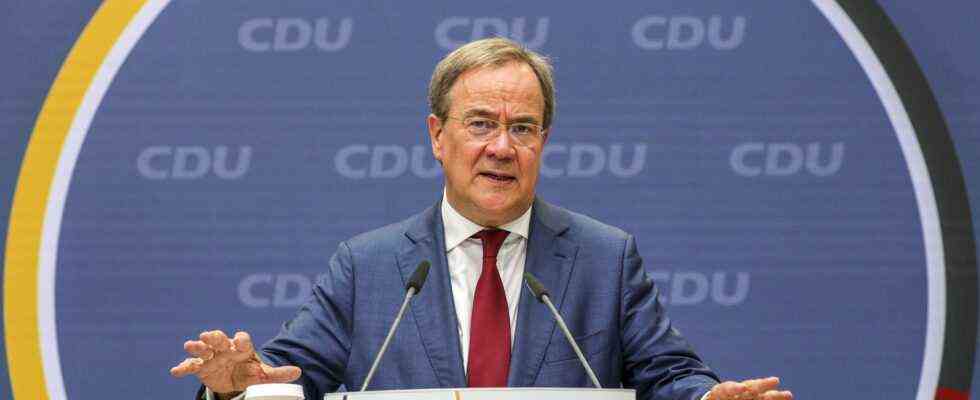analysis
Status: 08/17/2021 7:55 p.m.
“2015 must not repeat itself”, Union politicians emphasize again and again these days. In doing so, they are trying to set themselves apart in the election campaign in two ways. But can that work?
There it is again, this sentence: “2015 must not repeat itself”, warned the joint chancellor candidate of the CDU and CSU, Armin Laschet, at the beginning of the week. CDU General Secretary Paul Ziemiak, Federal Agriculture Minister Julia Klöckner, Union parliamentary group vice Thorsten Frei followed suit, as if they had agreed – they probably have too. CSU boss Markus Söder also stated that Germany could “not experience a second situation like in 2015” and warned of a “wave of refugees” from Afghanistan.
The Union politicians conjure up very specific images. In 2015, hundreds of thousands of people seeking protection, especially from Syria, came to Germany. Before that, there were pictures of sometimes inhuman conditions that the refugees were exposed to, for example in Hungary, or of long columns of people moving west on the highways.
Merkel’s decision
Chancellor Angela Merkel decided at the time to keep Germany’s borders open for people in need. Parts of the Union are still struggling with the decision to this day. Actually don’t lash. He supported Merkel’s actions back then and still considers it right today.
But that’s only part of the truth. Because when Laschet and others from the Union speak today that 2015 should not repeat itself, they are also sending a subliminal message: Don’t worry, dear voters, with us not so many refugees will again reach Germany.
You want to calm down. But the danger is that they indirectly stir up fears of an amorphous “wave” of foreigners and instrumentalize the hardship and fear of death that many Afghans are currently experiencing. Laschet, for example, when he speaks out against sending out the “signal” that “Germany can, as it were, accept everyone who is now in need”. Söder, who warns that one cannot take up the “concerns of all of Afghanistan in Germany or in Europe”. And also Ziemiak, who explains that the “question of Afghanistan” cannot be resolved “through migration to Germany” – which incidentally is never mentioned was.
So are the CDU and CSU engaged in public opinion campaigning on the backs of people in dire need? They obviously want to prevent the AfD from falling into an election campaign issue. Their co-group leader Alice Weidel had also declared that 2015 should not be repeated and called for the right to asylum to be suspended. However, it also met resistance from within its own ranks. This creates the absurd situation that the Union is trying to differentiate itself from the AfD by again taking over their narrative of the terrible year 2015 in order not to appear too liberal in migration policy.
Double protection
In addition, the Union is also trying to make a second delimitation: from the Greens, whose candidate for Chancellor Annalena Baerbock Söder accuses Söder of wanting to issue a “blank check” after she had asked for a quota for refugees from Afghanistan. This could trigger “additional pressure to migrate,” said Söder.
However, the warning of large refugee movements from Afghanistan to Europe hardly stands up to a reality check. In contrast to 2015, almost all escape routes are as good as tight. In addition, it has been shown again in the past few days that many people can hardly get out of Afghanistan. The country has been at war for basically 40 years. People have been trying to leave the country for decades. According to the United Nations Refugee Agency, UNHCR, up to 90 percent of those who managed to flee have stayed in Iran and Pakistan.
Fast and unbureaucratic?
There is little to suggest that this could suddenly change. And that can only be fine with the Union, because it relies on “local help”, i.e. money and, for example, infrastructure support for host countries. Both Laschet and the Chancellor have expressed their views accordingly. At the moment, however, the main question seems to be how to help Afghans who fear for their lives. Those who have worked for years for the Bundeswehr, the Ministry for Development Cooperation or political foundations, but also women’s rights activists, media professionals and politicians. Both groups should now be helped quickly and unbureaucratically.
In the case of the local staff, the Union parliamentary group in the Bundestag could have decided in favor of it at the end of June, but voted against a corresponding motion by the Greens (the SPD too, by the way). In the case of those at risk, there are indications that those who have not yet made it to Kabul airport will be hard to reach. In the election campaign, the presentation of the CDU and CSU as parties of hardship with a human face could possibly even get caught up in the matter of migration. But does that do justice to the plight of many people in Afghanistan?

